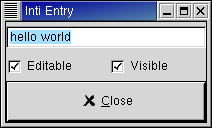Tutorial |
||
 |
||
|
|
||
|
Tutorial |
||
 |
||
|
|
||
|
| Entry(); explicit Entry(int max_length); |
| void
set_text(const String& text); |
| String get_text() const; |
| void
set_editable(bool is_editable); |
| void
set_visibility(bool visible); |
| void
select_region(int start, int end); |

| #include<inti/main.h> #include <inti/core.h> #include <inti/gtk/entry.h> #include <inti/gtk/checkbutton.h> using namespace Inti; class EntryWindow : public Gtk::Window { Pointer<Gtk::Entry> entry; protected: void on_enter(); void on_entry_toggle_editable(Gtk::CheckButton *button); void on_entry_toggle_visible(Gtk::CheckButton *button); public: EntryWindow(); ~EntryWindow(); }; |
| #include"entry.h" #include <inti/bind.h> #include <iostream> EntryWindow::EntryWindow() { set_title("Inti Entry"); set_size_request(200, 100); Gtk::VBox *vbox = new Gtk::VBox; add(*vbox); vbox->show(); entry = new Gtk::Entry; entry->set_max_length(50); entry->sig_activate().connect(slot(this, &EntryWindow::on_enter)); entry->set_text("hello"); int tmp_pos = entry->gtk_entry()->text_length; entry->insert_text(" world", tmp_pos); entry->select_region(0, entry->gtk_entry()->text_length); vbox->pack_start(*entry); entry->show(); Gtk::HBox *hbox = new Gtk::HBox; vbox->add(*hbox); hbox->show(); Gtk::CheckButton *check = new Gtk::CheckButton("Editable"); hbox->pack_start(*check); check->sig_toggled().connect(bind(slot(this, &EntryWindow::on_entry_toggle_editable), check)); check->set_active(true); check->show(); check = new Gtk::CheckButton("Visible"); hbox->pack_start(*check); check->sig_toggled().connect(bind(slot(this, &EntryWindow::on_entry_toggle_visible), check)); check->set_active(true); check->show(); Gtk::Button *button = new Gtk::StockButton(GTK_STOCK_CLOSE); button->sig_clicked().connect(slot(this, &EntryWindow::dispose)); vbox->pack_start(*button); button->set_flags(Gtk::CAN_DEFAULT); button->grab_default(); button->show(); } EntryWindow::~EntryWindow() { } void EntryWindow::on_enter() { using namespace std; String text = entry->get_text(); cout << "Entry contents: " << text.c_str() << endl; } void EntryWindow::on_entry_toggle_editable(Gtk::CheckButton *button) { entry->set_editable(button->get_active()); } void EntryWindow::on_entry_toggle_visible(Gtk::CheckButton *button) { entry->set_visibility(button->get_active()); } int main(int argc, char *argv[]) { using namespace Main; init(&argc, &argv); EntryWindow window; window.sig_destroy().connect(slot(&Inti::Main::quit)); window.show(); run(); return 0; } |
|
|
|||
|
|||